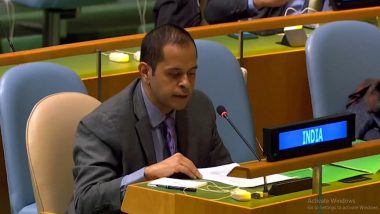New York, December 8: India has taken a holistic approach to health based on four main pillars of healthcare, including preventive healthcare, affordable healthcare, supply-side improvement and mission mode intervention, said Pratik Mathur, Counsellor at United Nations General Assembly (UNGA).
Delivering India's statement on 'Global Health and Foreign Policy' at the UNGA, Mathur said: "A healthy life is every person's basic right and the onus for this rests on our respective governments to make every possible effort to ensure full protection and enjoyment of this right by everyone." Also Read | Essential Workers, Who Risked Their Lives During COVID-19 Pandemic, Win TIME’s 2020 Person of the Year Reader Poll.
He also said that countries need to come up with long-term strategies and roadmaps to deal with future pandemics, adding that equitable access to affordable medicines, diagnostic tools and technologies remain a concern. Also Read | Shaheen IX: China-Pakistan Air Forces to Hold Joint Exercises in Bholari at Thatta District.
During the session, Mathur thanked Indonesia for putting forward the resolution this year on behalf of the seven-member countries on strengthening health system resilience to affordable healthcare for all, and welcomed the resolutions on the International Day of Epidemic Preparedness and UN Decade of Healthy Ageing from 2021-30 tabled under the global agenda.
While speaking on preventive healthcare, Mathur said India has put special emphasis on yoga, Ayurveda and fitness aimed at controlling at lifestyle diseases such as diabetes, blood pressure, hypertension and depression.
The Counsellor elaborated on the National Health Protection Scheme (NHPS) launched in September 2018, which played an essential role in promulgating affordable healthcare in the country.
"The scheme is based on a 12-pillar approach expanding access to primary healthcare services through health and wellness centres, and providing insurance coverage for secondary and tertiary hospitalisations to poor and vulnerable families," he said.
He informed that 24,608 hospitals have been included under the program, and 126 million health cards have been issued to people, adding that the scheme provides health insurance coverage of up to USD 7,000 per family per year for secondary and tertiary hospitalisations.
On mission mode intervention, he said: "We have started the National Nutrition Policy to improve the nutritional status of the people, specially disadvantaged groups, including mothers, adolescent girls, and children."
"In Sustainable Development Goals, 2030 has been set as the target for ending tuberculosis (TB). We plan to achieve this target by 2025, five years ahead of the deadline. To reach its goal, India has started implementing the National Strategic Plan and has substantially increased fund allocation for TB control," he added.
Mathur further claimed that the ongoing COVID-19 pandemic had highlighted the systemic weaknesses in health systems and vulnerabilities incapacity to prevent and respond to its threats.
"We need to address the major weaknesses and gaps to strengthen global coordination to ensure that the world is better prepared to curb impacts of the future health-related crisis," he said.
He asserted the need to capitalise on existing programs such as Access to Covid-19 Tools Accelerator (ACTA), and COVAX facility to ensure affordable and equitable global access to diagnostics, therapeutics and vaccines, while strengthening health systems.
"We are committed to partner with member states and other stakeholders to synergise our efforts to accelerate progress towards achieving Sustainable Development Goals and universal health coverage with the most productive, efficient and effective utilisation of resources," Mathur said.
(The above story is verified and authored by ANI staff, ANI is South Asia's leading multimedia news agency with over 100 bureaus in India, South Asia and across the globe. ANI brings the latest news on Politics and Current Affairs in India & around the World, Sports, Health, Fitness, Entertainment, & News. The views appearing in the above post do not reflect the opinions of LatestLY)













 Quickly
Quickly


